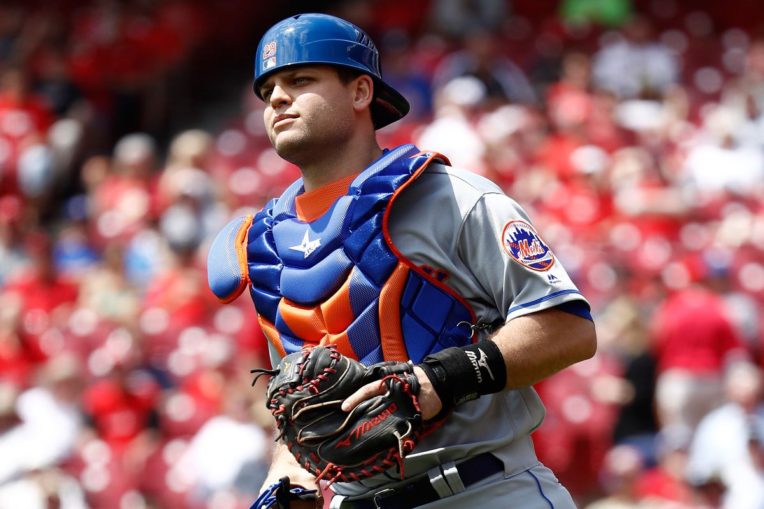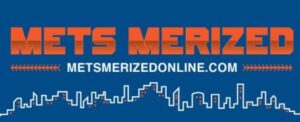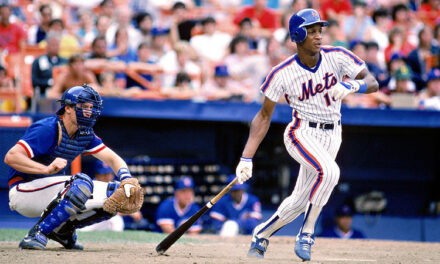
Devin Mesoraco is thankful for the opportunity he was afforded to play Major League Baseball for as long as he did.
Though his career wasn’t long and he dealt with three surgeries in a matter of thirteen months that marred his swing after an impressive breakout season in 2014, Mesoraco doesn’t look back with regret. Rather, he comes across with the rightful mindset that he did what so few could and made lasting memories during his eight-year major league career.
The Punxsutawney, Pennsylvania native recalls how his dad had him play all over the diamond to increase his skills on the field as a kid. Once they determined that his speed wasn’t an asset, but his arm was, Mesoraco shifted to full-time catching and was on the radar for several teams heading into the 2007 Draft.
Selected 15th overall by the Cincinnati Reds, Mesoraco became the club’s full-time catcher in 2013, and one year later made his first (and only) All-Star appearance. That year, Mesoraco hit 25 home runs, drove in 80 runs, and among 23 catchers with a minimum of 400 plate appearances that season, Mesoraco led in wRC+ (147).
Unfortunately for Mesoraco, the aforementioned surgeries restricted Mesoraco’s ability to replicate his 2014 season offensively. From 2015 until his last season in 2018, Mesoraco appeared in just 179 games, while playing no more than 84 games in any of those years.
Mesoraco, 33, played in his final major league season with the New York Mets in 2018, getting traded to the club while the Reds were playing the Mets in Cincinnati for a three-game set in May for right-handed pitcher Matt Harvey. The trade made for a relatively easy transition for Mesoraco as he knew Jay Bruce and Todd Frazier from their time in Cincinnati, along with being an easy commute using the concourse underneath the stadium to switch clubhouses.
In 66 games with the Mets in ’18, Mesoraco posted a .715 OPS with 10 home runs and 30 RBI. The Mets re-signed Mesoraco to a minor league deal with an invite to spring training for the 2019 season. Mesoraco was under the impression that he’d be third on their catching depth chart and have an opportunity to join the big club should Travis d’Arnaud be unready for the start of the season or if the club carried three catchers on their roster.
The Mets ended up reassigning the veteran catcher to Triple-A at the end of March, however, Mesoraco had no intention of playing in the minors. The catcher asked the Mets for his release to pursue other opportunities but the club refused his request, placing him on the restricted list instead. Mesoraco packed his bags and returned home, content with his career and wanting to be around his family more.
Since his retirement from the game, Mesoraco has lent his experience and expertise in the game as a volunteer assistant for the University of Pittsburgh’s baseball team. Mesoraco enjoys the team-oriented approach that collegiate ball offers, and is something that allows him to aid the next generation of players while staying close to home.
I had the privilege of speaking with Mesoraco where we discussed the three surgeries he underwent in thirteen months, getting traded to the Mets, and being placed on the restricted list.
MMO: Who were some of your favorite players growing up?
Mesoraco: I would say one is Derek Jeter. At that time when I was growing up in the late nineties, he was kind of everybody’s guy. The other guys were catchers; I liked Pudge Rodríguez because he was the top catcher at the time. Mike Piazza was a great catcher at that time and Jason Kendall was a catcher for the Pirates who was a pretty good player.
MMO: At what point during your development did you start focusing more on catching?
Mesoraco: Once I got into high school. Prior to that, I played everywhere. My dad was a coach and he wanted to make me well-rounded at different positions, but I wasn’t super-fast; I got a lot slower as my career went along.
It got to the point where I had a good arm and that was going to be my best path to having an opportunity to play in college or professionally and it made a lot of sense. Once I got into high school then I was a full-time catcher.
MMO: What are your memories from the 2007 Draft in which the Reds selected you with their first pick (15th overall)?
Mesoraco: It was an unbelievable day! I had a high school state playoff game. We played in Altoona, Pennsylvania, and that year we actually won the state championship. This was probably the second round of the state playoffs, I believe. I want to say we played the game at three o’clock and we didn’t really have time to drive back to Punxsutawney, it was a little too far.
We went to a local sports bar and the whole team came and everybody that was at the game came and we packed the place out. We were able to watch the draft on TV and it was an awesome memory to be able to share that with family and all my buddies and the other kids on the team.
MMO: Were you aware of the Reds’ interest prior to them selecting you?
Mesoraco: We had kind of a general area that we felt pretty confident that we were going to go in. If I recall right, I want to say that the Phillies picked No. 19 and we felt confident that I wouldn’t get picked past that pick. And there was some other interest earlier on and we went to visit some places and did a personal workout for a couple of teams in the top-tenish range.
I had no idea that the Reds were super interested; I think they kind of kept their things a bit quiet. We just knew that we’d be somewhere in the five to nineteen range, and I was very happy with that.
MMO: Your breakout season of 2014 was fun to watch. That was your first and only All-Star selection and you posted career highs in games played (114), home runs (25), RBI (80), and OPS+ (147). Was there anything you can think of that accounted for such a breakout season in 2014?
Mesoraco: Prior to that season I had been kind of more splitting time with a catcher by the name of Ryan Hanigan, who was very good and helped me out a lot defensively and just how to think about the game. At the end of the year in ’13, they told me that I was going to have a good shot [of playing more], and let’s see what you can do.
Not that I didn’t take the previous seasons seriously because I was prepared and ready to go, but we got a new hitting coach – his name is Don Long, he’s the hitting coach for the Orioles right now – and we talked a good bit in the offseason about a game plan of hey, these are some areas that can I improve, this is what we’d like to see you do. We really had a good foundation of what we thought we needed to do to go into spring training there and just worked on that stuff and got a chance to play every day.
I hit the ground running and had a really good start. When you’re a young player, at that time that would’ve been my fourth year and I had never been the everyday guy, you don’t really know if you’re good enough to be there. Can I handle it? Can I do it? You kind of have to find your footing.
I think it was a perfect time where I felt like I could play up there and would be fine and then they gave me the opportunity to play every day and a lot of things just clicked. It was a lot of fun and a really good year and something that I’ll certainly never forget.
MMO: I think something that fans don’t fully take into consideration is just how tough it is coming back from an injury and/or surgery. You had three surgeries in a 13-month span: left-hip labrum, labrum in your non-throwing shoulder, and right-hip labrum. Can you talk about undergoing all of those surgeries in such a short span, and how that impacted your play?
Mesoraco: After ’14 I signed a four-year contract with the Reds, and I think the tenth game of the year my hip was feeling like a stabbing pain. I had no idea what it was. I hadn’t felt pain like that and it just got to the point where I could barely squat down.
The doc checked me out and tried a bunch of stuff to get me back onto the field; cortisone shots, lubricating shots, a bunch of different things. If I was playing the outfield or something I probably could’ve delayed it but as a catcher, it was very difficult to do what I had to do behind the plate and I just couldn’t get in a good position.
I ended up having surgery in July and rehabbed that. The rehab process isn’t very fun, there are steps to take and it’s just a lot of grind in the training room and doing a bunch of things to help you feel better. I grinded through that rehab, got into spring training next year and it was feeling okay, the hip was better. I needed to get some at-bats to get my feet underneath me so to speak, and get back to how I felt.
We took it slow and started off the season and didn’t play very well and kind of the same thing, ten games into the season my shoulder was in pain every single swing. It was basically the same thing just in a different joint. It was like, man, this is unbelievable! You try to grind through a little bit, and it became very evident that I couldn’t play with this.
I think whenever you’re a player you can play sometimes but they don’t pay you just to play; they pay you to produce. They pay you to drive in runs, they pay you to hit the ball out of the ballpark. I just flat out couldn’t do any of that, it wasn’t even remotely close. I didn’t have the same swing. My labrum was completely torn and there was basically nothing there. So, they had to go in and replace that one, and then I grinded through that rehab process.
Then I had hip surgery because my other hip was basically the same from the imagining. I didn’t have any pain in that hip at the time, but the doctor suggested that we do it because well, heck, they don’t want me to miss three years in a row and something happens to that hip! We ended up doing the hip as well and the hips came back very normally, no issue. The shoulder was the one that continued to give me trouble. It always felt like I could never get in the same position that I used to be able to hit in. I never felt like I had the same zap in my swing. Whether I didn’t do the rehab correctly or whatever it was I just never felt like the same guy, and I knew that while I was playing.
That was a tough mental thing but I was able to play and do okay, but I just was never quite the same. But the three-year gap was very tough, just from a standpoint of I’m a competitor and I liked to be on the field.
It was just always trying to replicate what I did in 2014. I was always trying to find that swing. It got to the point where I knew I didn’t have that anymore and you have to find another way to do it. Everything became a grind; I couldn’t just show up to the ballpark and play ball. I had to grind through my neck is hurting today and dealing with my body and this and that. It became a real, real grind and not a whole lot of fun to show up to the ballpark.
MMO: During your time in the majors, were you a player that readily utilized analytics in your game planning?
Mesoraco: Oh, absolutely! I think people kind of get scared off by the term, but all it is information. I wanted as much information as I could get, especially game-planning for how we’re going to attack the opposition. That stuff was great and made a big difference.
It’s not anything scary and nobody’s trying to change the game, it’s just new things that can help. My thing was always you can use the analytics for evaluation, but how can you help the players become better by using that stuff? I wanted as much as I could get.
I think in general people are somewhat afraid of change or different stuff. Anything that can help you become a better player or coach is great.
MMO: Can you talk a bit about what a normal day-to-day routine would be for you in let’s say a night game?
Mesoraco: The first thing that I always wanted to do was put the game plan together of how we would attack the opposition. If we had someone with a lot of track record that had faced this team previously, take Jacob deGrom against the Braves, I would go in and watch all of Jake’s at-bats against Freddie Freeman. I would watch all of Jake’s at-bats against Dansby Swanson and kind of see what they were doing. Now, if you faced them a couple of times throughout the year you don’t necessarily have to watch all the at-bats, you know how you’re going to attack them. Then I wanted to see how those guys were doing recently. I would watch the last 20-to-30 at-bats that they had to see if maybe they’re off on this and that or they’re not hitting this quite as well right now as they usually do. And then put the game plan together.
They gave me a lot of stuff from upstairs, but by the time I got to the Mets, I had a pretty good idea of what I needed to know to go into a game and feel confident in what I’m calling.
I had my routine, and I went through that, put the game plan together, and then I’d get a little bit of hitting in. If it’s the start of the series, then you have a meeting with all the relievers and kind of go through the game plan. Once I got there Dave Eiland became pretty confident in the homework that I put in, so he kind of let me run the meeting, which I always thought was great because this was the guy that was putting down the signs, this is the guy they have to throw to. If they trust that I’m putting in my homework they’re just going to follow me and go with the game plan. I think he (Eiland) kind of understood that, too. He would give some input on some guys here and there, but I would say, for Freddie, anything moving into him is better, just no get-me-over off-speed stuff because he really hammers that.
Then we would take BP and meet with the starter for that day, and you go over a more detailed version of the meeting with the relievers.
MMO: Did you call your own game?
Mesoraco: All catchers in the big leagues call their own game. Upstairs may present some suggestions but not necessarily specific pitches. I do think some teams may do this more now, but a 1-1 count throw a breaking ball to Nick Markakis. They usually don’t get into that but I think some teams have kind of started to do more of that.
It’s all on the pitchers and catchers. The thing is with the pitchers, they can shake any time they want. It’s their game essentially, right? A lot of pitchers like to follow a catcher and if you gain the trust of those guys then they’ll definitely follow you. It just depends.
MMO: What are your memories from the day you were traded across dugouts to the Mets?
Mesoraco: It was wild. I kind of heard about it a couple of days before. Jay Bruce and Todd Frazier were over there, and they called those guys into the office and were asked what do you guys think of Mesoraco? Just trying to make sure I wasn’t a terrible teammate or guy. [Laughs.) I think they gave a pretty good report, so I was kind of aware that something might happen.
I was supposed to play on the Reds’ side and we’re just getting ready to play. They probably had to go over my medicals which probably took, who knows, three days? That might’ve been one of the holdups, and they’re going over that. Probably two hours before the game I got called into the manager’s office and the GM and everybody were there and just said, “We’re trading you, but you’re going right across.”
I was pumped up; I was excited because we weren’t playing very well at the time and the Mets had the better record. I was pumped to go over there and I knew they needed a catcher. I grabbed all my equipment, walked across the concourse underneath the stadium, and walked into that clubhouse.
It was easy because Jay and Todd were over there, so it was great. I got over there I want to say fifteen minutes before the game, and I was just sitting on the other bench. It was pretty wild.
MMO: If I recall correctly, you did appear in that game as a pinch-hitter late.
Mesoraco: Yeah, I pinch-hit and struck out. Then I played the next day. As a player, it’s easy whenever you get traded. It’s more of the off-the-field stuff with your wife or whoever, and we had a young son at the time. That aspect of it is a little more hectic.
MMO: You got to catch Jacob deGrom in his first Cy Young-winning season. What makes deGrom so special in your opinion?
Mesoraco: Jake is unbelievable. He can throw any pitch to any spot, both sides of the plate, up and down. He can throw his slider up in the zone and shorten it up and make it cut. He can do anything; there’s nothing that he can’t do.
The other side that you see with Jake is his competitiveness. This guy just doesn’t want to allow any runs, he doesn’t want to make a bad pitch in the bullpen session three days before a start! He gets mad about that. That isn’t typical, not everyone is like that. Everyone is obviously putting work in, but Jake is on a whole other level.
Stuff-wise, he wasn’t throwing as hard as he’s throwing now back in ’18, but it was still unbelievable. To me, it’s probably the best fastball from a starter in the big leagues, probably one of the best sliders, and probably one of the best changeups from a starter. He had all the weapons, the preparation, he just had everything. It’s hard to be as good as Jake is.
MMO: Is deGrom the best pitcher you caught in your career?
Mesoraco: Oh, absolutely. I don’t think that’s relatively close either. I think that Jake is one of the top two or three pitchers of this generation. He’s unbelievable.
MMO: Do you have any beliefs as to why deGrom has been able to add velocity to his 4-seam fastball as he’s gotten older?
Mesoraco: No. I don’t think anyone does. It doesn’t happen, Jake is a complete outlier in that regard. I think it could be partly because he didn’t pitch that much growing up. I don’t think anyone can explain it but it’s fun to watch.
MMO: Things got a bit rocky in 2019 when the Mets reassigned you to Triple-A and then later put you on the restricted list after you made your intentions known that you were not going to play in Triple-A. Can you talk a bit about that series of events and where you’re at with that now? I remember reading a tweet this year in which you asked Steve Cohen to take you off the restricted list.

Mesoraco: Yeah, that was just a joke. I figured that would get some laughs on Twitter. It really wasn’t that big of a deal. I had signed and the idea that Travis [d’Arnaud] may not be ready, and if not, I’d be the guy. Otherwise, I might be good depth and get a chance at some point during the year. And I was fine with that but they made it seem like I was going to be the third guy.
Spring training came about, and spring training is what it is. I don’t know if I played super well but I thought I was fine. It got down to it and I didn’t sign there to be the fourth guy, I grinded enough and earned good money so I was comfortable with where I was.
I didn’t’ have the Triple-A grind all year in me, I didn’t want to do that. I just said I would like to go somewhere where I have a better opportunity to get to the big leagues because it was very clear that they liked [Tomás] Nido and that’s there right. But that wasn’t my intention of signing there, I didn’t sign to be the fourth guy, so go ahead and release me. Whether I’d sign somewhere else or not or even had a better opportunity, I don’t know. But I had no intentions of showing up and being the fourth guy.
They said, “Let’s take a couple of days and think about this and talk again.” I said, ‘I don’t really need to talk. I don’t want to be the fourth guy. That’s very clear what I am and that’s your right, do whatever you have to do to, but I’m not going to be playing for you guys.’
That was it really and they called and said I was being put on the restricted list, which I was fine with. As I said, I was happy with my career; I wasn’t the same player and I didn’t want to go to Triple-A and grind it out. The only interest that I had in continuing to play was in the big leagues. If I had to go somewhere for a couple of weeks and do something in Triple-A, sure, I may have done that. But I didn’t really have a ton of interest in doing that. So, I packed up my car and went home and retired, I guess.
MMO: So you don’t hold any grudges or have any ill will towards the club?
Mesoraco: No, they were within their right to do that. I was under contract, and they don’t have to necessarily come to terms all the time and that’s okay. They were trying to build depth with the organization, and they can go about that in different ways, and I was fine with it. I wasn’t personally mad at those guys or anything, I just didn’t want to do it. I wasn’t interested in being the fourth guy.
I’m not someone that holds grudges or looks at the past, it is what it is, and you move on and go to the next phase of your life. Which for me, is mostly being a dad which is great!
MMO: You joined the University of Pittsburgh’s baseball staff as a volunteer assistant last year. How did that come about and what are your responsibilities with the team?
Mesoraco: I needed to get out of the house. I was in the house and I started doing some wood workings and doing a lot of yard work. I know baseball very well and I just wanted to be part of teaching kids and helping them out and being part of the team. At the professional level, it becomes a lot individualized these days, and rightfully so because that’s how people earn their living. But down here it’s more team-oriented and the goals of the team and how can we win and do better, and that kind of appealed to me.
I reached out to coach [Mike] Bell who is the head coach at Pitt, and they had an opening for a volunteer role, and I thought that was perfect. I’m very thankful that it happened, and I get to come down here and coach, be part of the team and help the kids out. It’s been very enjoyable.
MMO: Where do you envision the next stage of your career going? Would you want to get back to working in the majors, or do you want to stay at the collegiate level?
Mesoraco: I don’t know, that’s a tough question. In pro ball, you see the time that the coaches put in and the time away from their families and at this point, I don’t think that’s necessarily something that I want to do. Sure, at some point once the kids get older, maybe I could see myself getting into that side of it.
College coaching is great because in my role you’re at home. Some of these guys are traveling to recruit a lot but I don’t have to recruit so that works out well. I could see going into pro ball, but it would have to be something that’s worthwhile. Those guys have to work so hard and work their way up from the minor leagues and the grind of going through each level and things of that nature, I don’t know if I necessarily have that type of grind. I just take it day-by-day at this point.
MMO: Thanks very much for the time today, Devin. It was great speaking with you.
Mesoraco: Appreciate it!
Follow Devin Mesoraco on Twitter, @DMesoraco















